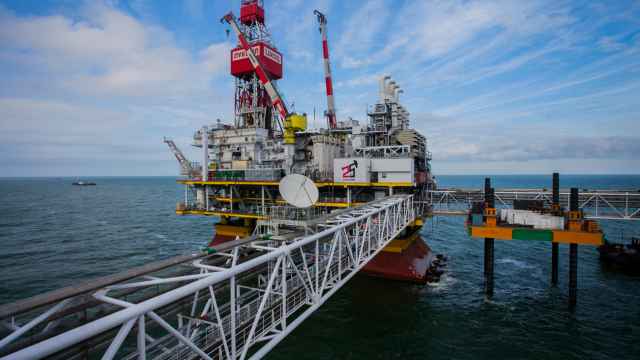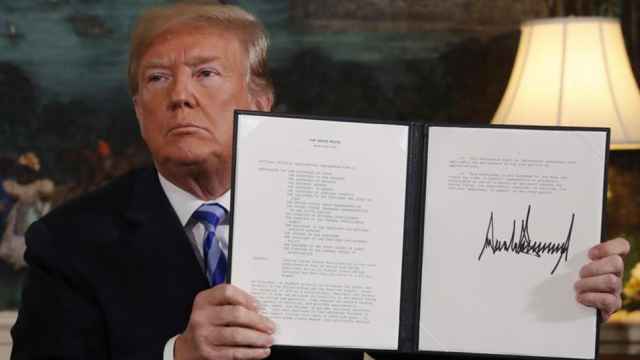Oil prices remain volatile as the escalation between Israel and Iran threatens to spill over onto a regional scale.
While this instability boosts Russian coffers, the extent of the gains depends on how long the conflict lasts and how intense it is.
Moscow benefits most from a protracted conflict that leaves uncertainty over energy supplies but does not spill over into all-out war.
Here's a closer look at how the Israel-Iran confrontation could impact Russia's bottom line:
What happened?
On Sunday, Iran's parliament approved a measure to close the Strait of Hormuz, a vital energy corridor used by Iran, Saudi Arabia, Iraq, Kuwait, Qatar and the United Arab Emirates to export one-third of the world’s seaborne oil and gas.
The news brought Brent crude futures to a high of $81.40 per barrel on Monday, before Donald Trump’s announcement of a ceasefire between Iran and Israel sent it plunging to $67.30 per barrel.
This is slightly up from the $66.60 per barrel recorded on June 11, before tensions escalated into open conflict.
The situation in the region remains precarious despite Trump’s announcement as Iran and Israel have yet to reach a formal ceasefire agreement. Reports said that the sides continued to exchange strikes as recently as early Tuesday morning.
On Monday, Goldman Sachs estimated that Brent crude could briefly peak at $110 per barrel if oil flows through the Strait of Hormuz are halved for a month.
The bank forecast an average price of $95 per barrel for the fourth quarter of 2025 if disruptions occur. By comparison, in March, it had forecast an average of $78 per barrel for the entire year.
Why is the Strait of Hormuz important?
The key risk in a war between Iran and Israel remains potential disruption to regional energy exports, particularly through the Strait of Hormuz, where Tehran could obstruct passage.
About 14 million barrels of oil per day, or about 20% of global oil volumes, are transported through the strait, including Iran’s own exports.
Some countries have alternative routes. For example, Saudi Arabia can export some of its oil via the East-West pipeline to Red Sea ports, and Iraq can export its oil through pipelines in Kurdistan.
Nevertheless, a significant amount of oil and LNG would be stranded without access to the strait.
“Most volumes that transit the strait have no alternative means of exiting the region, although there are some pipeline alternatives that can avoid the Strait of Hormuz,” according to the U.S. Energy Information Administration (EIA).

How does Russia benefit?
Russia could benefit from the crisis in two ways.
First, oil supply shortages may create tightness in the global market, pushing the overall price higher. This means that Russian oil will trade at a premium, and Western countries will likely postpone further sanctions on Russian energy until the crisis subsides.
Secondly, Russia would benefit more directly from potentially substituting the Middle Eastern oil and gas China receives with its own.
According to the EIA, 84% of the crude oil, condensate and liquefied natural gas that passed through the Strait of Hormuz in 2024 went to the Asian market, with China, India, Japan and South Korea as the primary destinations.
According to Chinese customs data, Russia was the leading exporter of crude oil and condensate to China in May 2025, shipping $3.88 million dollars worth of oil. Saudi Arabia followed with $2.84 million and Iraq with $2.69 million.
How high can the price of Russian oil rise?
Precisely how much Russia can gain from the Middle East conflagration depends on its timing and intensity.
According to analyst Alyona Nikolayeva, Russia would benefit most from a protracted conflict of limited intensity. This way, uncertainty over the energy supply remains, but there is no massive shock to the global economy that could lead to a slowdown in demand for oil and gas.
Moderate disruptions to supply routes in the Middle East could cause the price of Russia’s flagship Urals blend to reach $75, Nikolayeva said. This would significantly reduce the gap between Urals and the global oil benchmark Brent, bringing the so-called Urals discount down to just $2.
This compares to the Urals price of $52 per barrel recorded in May, which had a discount to Brent estimated at $6.
Analyst Pavel Ryabov said that although a closure of the Strait of Hormuz is unlikely, the confrontation between Iran and Israel may continue for some time.
“I believe the markets are wrong, there may be the calm before the storm, but not yet a sustained de-escalation,” Ryabov said of the market's reaction, including the drop in oil prices after the ceasefire announcement between the U.S. and Iran.
How much can the Russian budget get?
A boost to Russian energy prices would be a boon for Moscow's federal budget and war chest at a time when its oil and gas revenues have been shrinking due to sanctions and fears of a potential global economic slowdown that would decrease demand for oil and gas.
In May, Russia's Finance Ministry slashed its 2025 energy revenues forecast by 24% due to expectations of a prolonged period of low oil prices.
Russia exports approximately 4.7 million barrels of crude oil daily. An increase of $20 per barrel in the price of Russian oil would generate around $2.8 billion in additional revenue per month.
If prices remain elevated for the next six months, Russia would earn an additional $16.8 billion in export revenue. While this is not a game-changer, it could help the government end the year with a less dramatic deficit.
For context, last year, Russia's deficit amounted to 3.2 trillion rubles, or about $41 billion.
A Message from The Moscow Times:
Dear readers,
We are facing unprecedented challenges. Russia's Prosecutor General's Office has designated The Moscow Times as an "undesirable" organization, criminalizing our work and putting our staff at risk of prosecution. This follows our earlier unjust labeling as a "foreign agent."
These actions are direct attempts to silence independent journalism in Russia. The authorities claim our work "discredits the decisions of the Russian leadership." We see things differently: we strive to provide accurate, unbiased reporting on Russia.
We, the journalists of The Moscow Times, refuse to be silenced. But to continue our work, we need your help.
Your support, no matter how small, makes a world of difference. If you can, please support us monthly starting from just $2. It's quick to set up, and every contribution makes a significant impact.
By supporting The Moscow Times, you're defending open, independent journalism in the face of repression. Thank you for standing with us.
Remind me later.







